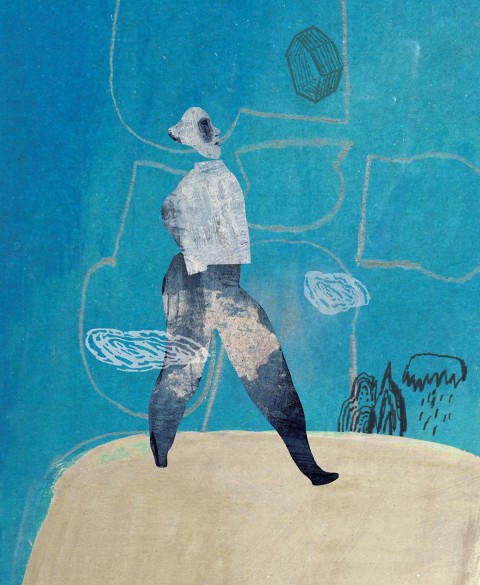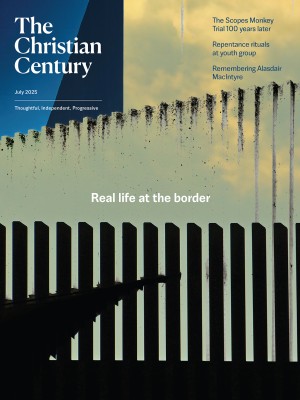My new understanding of mountaintop faith
Together, the Psalms and the Korean concept of han have changed my perspective on the emotional Christianity of my childhood.

Illustration by Jorge González
In the Korean American immigrant church of my childhood, the mountaintop was everything. Winter and summer retreats, sites of concentrated revival spirituality, represented high seasons in the church calendar, up there with Christmas and Easter. The longing for revival fueled our life together. On the mountaintop, we felt that anything was possible. Back on level ground, to stem the inevitable tide of backsliding, there were additional revival services between retreats. The truly devout frequented gidowons (literally, “prayer mountains”), a kind of retreat center where it was not unusual to hear shouts of prayer around the clock. Slipping into ordinary time was unavoidable, but not to worry: extraordinary seasons were not far off. One only needed to be diligent in prayer and watchfulness.
As I grew up, I drifted from what I perceived to be the unhealthy roller coaster of emotional Christianity. In college, I picked up Charles Finney’s Lectures on Revival at a used bookstore to better understand and, let’s be honest, to critique the methods of the Second Great Awakening. After seminary, I went to graduate school to study the aftermath of the Great Awakening, convinced that there would be much damage and dysfunction to dissect.
Read our latest issue or browse back issues.
What I didn’t grasp about the mountaintop spirituality of my parents was their intimate familiarity with the valleys and plains of life. A paradigm-shifting lesson for me later in life came with discovering han as a lens for understanding Korean culture. According to Minjung theologian Suh Nam-dong, han is the “feeling of unresolved resentment against injustices suffered, a sense of helplessness because of the overwhelming odds against one, a feeling of acute pain in one’s guts and bowels, making the whole body writhe and squirm, and an obstinate urge to take revenge and to right the wrong—all these combined.” Put another way, han is the agglomeration of a long history of invasion and conquest, like angst but miles deeper because of its resistance to structural oppression.
Once I learned about han, I saw it everywhere. Its pervasiveness helped me understand how experiences of lament and rage fired the longing for spiritual renewal. At the heart of Korean Christianity’s intense preoccupation with spiritual kindling, I realized, was not merely an inordinate passion for revival, but a pathos rooted in the struggle for survival.
This change in perspective also helped me realize that not all mountaintops are the same. Consider Psalm 1, which represents one kind of spiritual peak. The Psalter opens with a bang, but by projecting a binary view of the world: the righteous will prosper, and the wicked will perish. It is the confidence of untested faith, almost immediately shaken as we move through the early songs: “O Lord, how many are my foes!” (3:1). Contrary to Psalm 1, life for the faithful is unexpectedly forlorn: “I am weary with my moaning” (6:6). Expressions of doubt, pining, and anguish are found throughout this songbook: “How long, O Lord? Will you forget me forever?” (13:1).
Even at the midpoint of the Psalter, there is little relief: “For I was envious of the arrogant; I saw the prosperity of the wicked” (Psalm 73:3). It’s jarring to realize the opening verses of Psalm 73 offer a direct challenge to the theology of Psalm 1. The wicked—far from perishing—are prospering, and the reason for confidence in Psalm 1 has become a source of crisis in Psalm 73. The psalmist can’t help but cry out, protesting the injustice of it all.
Together, han and the Psalms taught me to appreciate a spirituality that is equally familiar with peaks and valleys. They helped me see the revival spirituality of my youth as deeply grounded in sadness, lament, even rage at the state of the world—themes that are amply represented throughout the Hebrew songbook of faith. Talk of drenching my bed with tears and raining coals of fire and sulfur on one’s enemies may upend our expectations for a songbook of faith and hope. They also express the lived experiences of ordinary people and provide glimpses into the anguish of han. They reflect the rugged, weather-beaten spirituality of Psalm 73 more than the wide-eyed innocence of Psalm 1.
To be sure, Psalm 1 is part and parcel of the journey of faith, whether as a starting point or a way station. But there is also a dynamic movement across the whole of the Psalter. As Walter Brueggemann has written, the Psalms move from duty to delight, from obedience to praise.
Longing for revival doesn’t have to involve navel-gazing or self-indulgence. In a world where so much is wrong, where the wicked prosper, I now find it hard to imagine complaining about songs and prayers for mountaintops. A spirituality of the Psalms refracted through han helps me imagine a faith that decries the unjust and pleads for justice in all of life: mountaintops, valleys, and plains.







